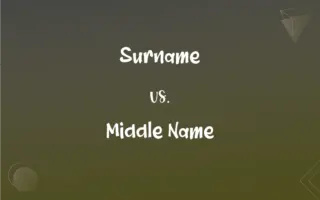Ideal vs. Standard: What's the Difference?
Edited by Aimie Carlson || By Janet White || Published on December 1, 2023
"Ideal" refers to a perfect or most desirable model, often theoretical, while "standard" is a level of quality or attainment that is considered typical or acceptable.

Key Differences
An ideal represents a concept or standard of perfection, often used in a philosophical or moral context. It's a goal or an example of excellence that one strives to achieve. A standard, in contrast, is a level of quality or achievement that is considered normal or acceptable in a particular context.
Ideals are often aspirational, embodying the best or most perfect scenario, like an ideal work-life balance. Standards are more practical, serving as a benchmark for measuring quality, like industry standards.
In achieving objectives, striving for an ideal might involve aiming for a near-perfect outcome, despite it being hard to attain. Meeting a standard is about reaching a set level of quality or compliance that is deemed acceptable or required.
Ideals can vary greatly depending on individual beliefs and values, and they can be subjective. Standards, however, are often established by consensus or authority, and are used to ensure consistency and reliability in various fields.
An ideal is a model of excellence or perfection, often unattainable but inspirational, while a standard is a defined benchmark or norm used to measure or regulate quality or performance.
ADVERTISEMENT
Comparison Chart
Nature
Theoretical model of perfection
Established level of quality or norm
Purpose
To inspire or provide a goal
To regulate or ensure consistency
Attainability
Often aspirational and hard to attain
Practical and achievable
Variability
Subjective and varies by individual or context
Generally objective and consistent
Use in Context
Philosophical, moral, personal goals
Industry norms, quality control
ADVERTISEMENT
Ideal and Standard Definitions
Ideal
Ideal refers to a conception of something in its most perfect form.
Her ideal vacation involved sunny beaches and peaceful surroundings.
Standard
A standard is a level of quality or attainment regarded as typical or acceptable.
The product met the industry's safety standards.
Ideal
Ideal can also refer to something that is most suitable or desirable.
The quiet countryside was the ideal setting for the retreat.
Standard
In manufacturing and production, a standard is a set of criteria used to ensure quality and consistency.
Their processes followed the highest quality standards.
Ideal
An ideal is an ultimate standard of excellence or a goal that one aspires to.
His ideal of honesty guided his decisions.
Standard
A standard can be a rule or principle used to judge or decide something.
The company's standard for customer service was exceptionally high.
Ideal
In philosophy, an ideal is a concept of something as perfect or model.
The concept of utopia is an ideal society.
Standard
Standard also refers to something widely recognized or employed as a model of authority or excellence.
The dictionary is considered the standard reference for language.
Ideal
An ideal can be a principle or value that one considers to be perfect and strives to achieve.
Living a life of simplicity was her personal ideal.
Standard
Standard refers to something established as a model or norm in quantitative, qualitative, or operational terms.
The test results were compared against national standards.
Ideal
A conception of something in its absolute perfection
The ideal of national unity.
Standard
Serving as or conforming to an established or accepted measurement or value
A standard unit of volume.
Ideal
One that is regarded as a standard or model of perfection or excellence
The restaurant is considered the ideal in fine dining.
Standard
Widely recognized or employed as a model of authority or excellence
A standard reference work.
FAQs
What is an example of an ideal?
A society with no crime is an ideal.
Can ideals be realistic?
Ideals are often aspirational and not always realistic.
Are standards legally binding?
Some standards, like safety standards, can be legally binding.
Do ideals change over time?
Yes, ideals can evolve with societal and personal changes.
Is an ideal always perfect?
Ideals represent a conception of perfection, though subjective.
What is a standard of living?
It's a level of wealth, comfort, and material goods available to a person or community.
Who sets standards in an industry?
They are often set by regulatory bodies or industry groups.
How do ideals influence behavior?
Ideals can guide a person's choices and actions.
What does standard mean in business?
It refers to accepted criteria or norms in business operations.
Can a person have their own ideals?
Yes, individuals often have personal ideals.
Why are ideals important?
They provide goals and direction for improvement and aspiration.
Can companies have their own standards?
Yes, companies often set their own operational or quality standards.
Is an ideal attainable?
Ideals are often aspirational and not always attainable.
What's the importance of having standards?
Standards provide consistency, safety, and reliability.
Do standards evolve?
Yes, standards can evolve with technology and societal changes.
How are standards enforced?
Through regulations, inspections, and certifications.
Are standards the same worldwide?
Some standards are international, while others vary by region.
How do ideals affect society?
Ideals can shape societal goals, ethics, and aspirations.
Do standards ensure quality?
Standards are designed to ensure a certain level of quality.
Can ideals conflict with reality?
Yes, ideals can sometimes be in conflict with practical realities.
About Author
Written by
Janet WhiteJanet White has been an esteemed writer and blogger for Difference Wiki. Holding a Master's degree in Science and Medical Journalism from the prestigious Boston University, she has consistently demonstrated her expertise and passion for her field. When she's not immersed in her work, Janet relishes her time exercising, delving into a good book, and cherishing moments with friends and family.
Edited by
Aimie CarlsonAimie Carlson, holding a master's degree in English literature, is a fervent English language enthusiast. She lends her writing talents to Difference Wiki, a prominent website that specializes in comparisons, offering readers insightful analyses that both captivate and inform.






































































